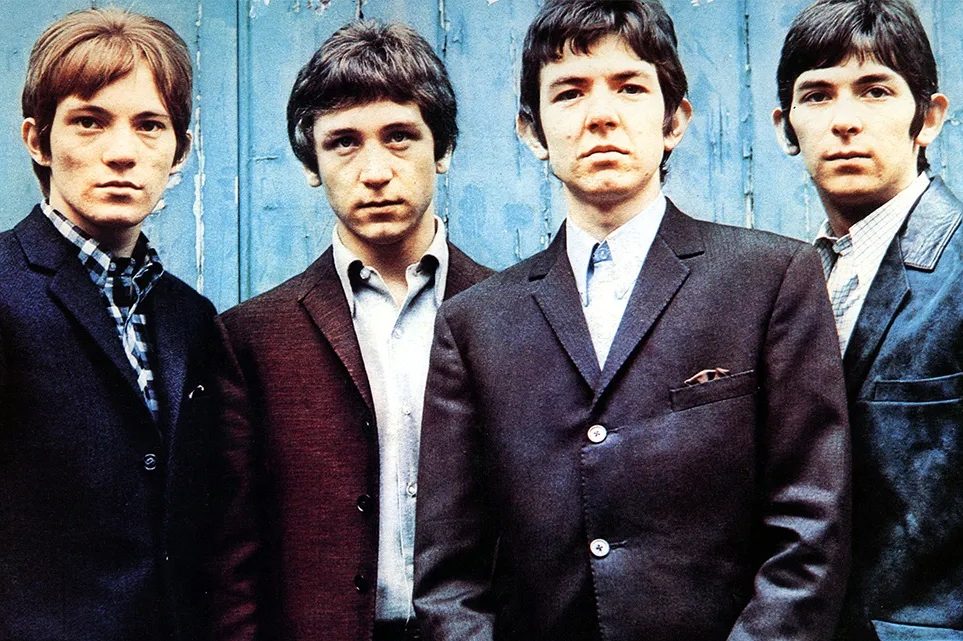One Sunday in October 1967, about 16 percent of the British population settled down at 8:15 p.m. to watch the Morecambe & Wise Show on ITV. This was mainstream family entertainment aimed at all age groups, but there was also a place each week for teen-friendly acts from the pop charts. That evening it was the turn of four sharply dressed East End mods, who managed to inject some real heart and soul into their band’s performance. “They look very nice, don’t they?” said Ernie, to which Eric replied: “They look extremely nice, except for one thing. Their faces are too small, I feel. Much too small.”
Mild leg-pulling of this kind was par for the course. Future guests, such as multiple Academy-Award nominee Vanessa Redgrave and the genial French crooner Sacha Distel, were cheerfully addressed by their hosts in turn as Vanilla Rednose and Slasher Distillery. But many watching the Small Faces that night singing “All or Nothing” would have assumed that their two-year career had brought them to the peak of success, and the money was rolling in. However, with many other 1960s hit-makers, the story behind the scenes was very different. A combination of punishingly low record royalty rates, disputes with management, fraying inter-band relationships and an abiding unwillingness to be regarded as mere chart-fodder for screaming fourteen-year-olds saw them split up little more than a year later, shortly after the release of their landmark third studio album, Ogdens’ Nut Gone Flake.
Sean Egan’s entertaining and thoroughly researched book, Long Agos and Worlds Apart, is billed as “the definitive Small Faces biography.” This is a bold claim about a much loved band whose reputation has only grown with the passing decades — and whose every action during a short career from 1965 to 1968 has been examined in multiple books, articles, documentaries and website entries — but it’s largely justified. Egan draws on interviews he has conducted over the years with many of those involved, including the now-deceased original members Ian McLagan and Jimmy Winston, and the sole survivor, drummer Kenney Jones. He tells a compelling tale of the band’s rise and disintegration, their brief, ill-starred late-1970s reunion and subsequent careers.
By the time of their Morecambe & Wise appearance they had already promoted their songs on TV shows such as Thank Your Lucky Stars, Top of the Pops, Ready Steady Go, Here Come the Pops, Five O’Clock Club, Scene at 6:30 and A Whole Scene Going,demonstrating the power wielded by their much feared first manager, the late Don Arden, a man happy to refer to himself as the “Al Capone of Pop.” In Johnny Rogan’s 1988 book about British rock managers, Star-makers & Svengalis, Arden talked openly about hyping his artists into the Top Twenty:
I paid out anything from $200 to $600 a week to people who manipulated the charts… Neat little swindle, wasn’t it? Of course, the Small Faces had no idea what went on
The songs that benefitted from such tactics, timeless recordings of the quality of “Whatcha Gonna Do About It” and “Tin Soldier,” thoroughly deserved to be hits anyway; but as always the fattest wallets and the best connections could make the difference between success or failure. While cash flowed in all directions, not remotely enough found its way to the Small Faces. Jones, who has since spent many years trying to recover money due the band, turned down an offer at the time from a cousin connected to the Krays to punish Arden, but now says: “With hindsight, I should have let him break his legs.”
Splitting from Arden with the aid of lawyers, they hooked up with Andrew Loog Oldham, the former Rolling Stones manager, a man with his own promotional ideas for the band, such as deliberately provocative advertisements parodying the Lord’s Prayer (“Small Faces / Which were in the studio / Hallowed be thy name…”). The hits continued, yet by the close of 1968, burnt out from touring and frustrated by the group’s inability to effectively reproduce the studio experimentation of their recent Ogdens’ LP, the singer Steve Marriott walked off during a show at Alexandra Palace, precipitating the band’s early demise.
Given the eventual longevity of the Stones, their direct contemporaries, this was a huge loss, although their sound remained a key influence for later groups. The Sex Pistols covered “Whatcha Gonna Do About It” in their early days, and as their guitarist Steve Jones recalled, he and the drummer Paul Cook had learned their trade “taking lots of speed and trying to re-enact what it was like to be in the Small Faces or the Who.”
Marriott said shortly after the split that he was tired of being the “ten by eight glossy teen scream of the year.” But as this book rightly argues, the Small Faces were always so much more than that.
This article was originally published in The Spectator’s UK magazine. Subscribe to the World edition here.

























